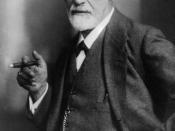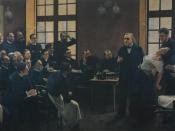Freud says, on page 2, that, "hysterical symptoms are the expression of their most secret and repressed wishes." Therefore the patient is not going to betray those secrets easily, especially if they exist deep within the subconscious and the patient does not even know of them. Later, on page 10, Freud discusses the impact of these symptoms on the discourse between patient and physician. While the patient may be willing to give great detail about a certain period in their life, there may be another period where the detail are not clear and another period where there is no information to be relayed at all. It is necessary to listen for patients like Dora to frequently change the details in a single story and then return to their first version of the story. According to Freud, tendencies such as these are not simply indicative of neurosis but three degrees of repression which include the patient consciously holding back information they should tell but cannot due to feelings of timidity or shame.
Additionally, what Freud refers to as "unconscious disingenuousness" may be occurring where facts that the patient knows disappear as they tell the story. Finally, true amnesias may be taking place with the formation of paramnesias to fill in the gaps. The descriptions Dora offers should be open to chronological re-arrangement. Freud says that amnesias are fulfilled by destroying connections which are destroyed by 'altering the chronological order of events.' It is then, also necessary to pay close attention to the memories provided and their relation to the history of the illness and to pay as much attention to the social background of the patient as the physical.
The physician in this description must be on the alert for details that are constantly changing or periods in the patient's...


